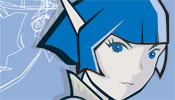
BIOGRAPHY
Alecia Magnifico is a doctoral student in the Learning Sciences program at the University of Wisconsin-Madison Department of Educational Psychology. She is broadly interested in subject-specific literacies (science literacy, in her current project), how writing matters to literacy development, and how writing can be integrated into learning through games and technological tools.
In the past, Alecia has been a teacher, poet, and education policy student. As an undergraduate at Swarthmore College, she balanced her time among studying comprehensive school reform, writing her poetry concentration, and working with the Math Forum research group. She then became a classroom teacher, first of English literature and drama in England, and later of fifth grade and middle school technology in California.
Currently, Alecia is working on the science.net project, exploring how students' writing and thinking within the genre of journalism can lead them to develop a broader sense of how and why science and technology matter to society.
ABSTRACT
Games for Thought: The Future of Education & How We can Get There.
Symposium, Friday (3:15 - 4:45) in
Hall of Ideas E
Role playing games let players take on new identities and explore new worlds. Here I look at an epistemic role playing game in which students become science journalists. In Science.Net, players interview, research, and compose stories for an online science newsmagazine. Taking on the identity of science journalists, they learn about the science in their community and how diverse members think differently about it. In this talk, I look at how this identity transformation takes place in Science.Net. I focus on how the work of science journalism - particularly copyediting and rewriting news stories - helps players develop the skills, values, identity, knowledge, and epistemology of the profession of journalism. That is, I look at how Science.Net helps players develop the epistemic frame of journalism. I will present data from two stages of Science.Net gameplay and show how students learn how to think differently about journalism and science from their experiences.